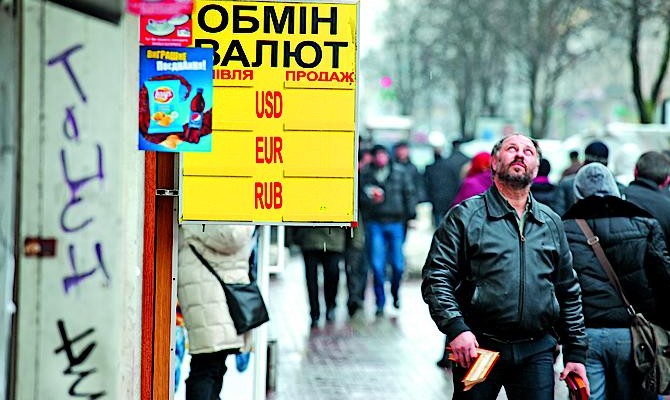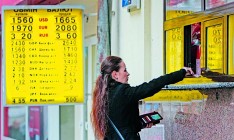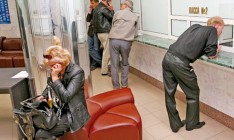Finance
CurrencyHard currency that the NBU sells to commercial banks has not appeared on their counters

Last week the National Bank of Ukraine organized a raid of branches of Kyiv banks in an attempt to buy U.S. dollars. After a failed attempt of the NBU Governor Valeriya Hontareva to acquire US $200 at the counter of Sberbank of Russia, employees of the regulator organized similar control purchases all throughout the city, informed NBU spokesperson Inna Hordiyenko.
Discovery of America
Control purchases by NBU employees gave the same results as Hontareva’s efforts – several banks that earlier purchased hard currency on the NBU auction did not have dollars to sell. This is notwithstanding the fact that over the past two weeks the central bank injected into the market US $562 mn from its gold and forex reserves to support the exchange rate of the national currency, informed First Deputy NBU Governor Oleksandr Pysaruk.
The auction for the sale of currency for the purpose of supporting bank counters was held on October 9. The central bank sold around US $99 mn to 54 banks, thus satisfying 80% of the demand. On Friday, the central bank held another auction selling US $200 mn for the needs of bank clients. Overall, the regulator has held seven such auctions since the start of September.
Pysaruk said the NBU intends to continue selling currency at auctions until the foreign exchange market is stabilized. This may take several weeks or even until the end of the year, he specified. The sale of hard currency in these volumes is not critical for the NBU reserves so far. “We believe that the volumes of interventions that are currently being performed are sufficient and that we will be able to continue them as long as it takes to stabilize the market,” said Pysaruk. By the time the balance between demand and supply is achieved, the exchange rate will be at the same level as it is today at UAH 13/US $1 with slight fluctuations, Pysaruk predicts.
Meanwhile, not everybody shares this optimism. “We cannot speak about stabilization until positive news from exporters appear and currency earnings are generated from them,” says analyst at the International Center for Policy Studies Oleksandr Zholud.
The other day, Hontareva also said that the country will see an economically substantiated rate of UAH 11.70/US $1 only after the operation of a number of export-oriented industrial enterprises is renewed. The NBU does not know the extent to which the demand for currency is not being satisfied. “This is due to the black market factor, the volume of which we cannot clearly define,” said Pysaruk. Meanwhile, importers are experiencing the shortage of hard currency. President of the Association of Oil Products Market Operators Leonid Kosyanchuk told Capital that companies are barely able to buy hard currency to last them a week.
“So far, the volumes of dollars that can be purchased on auctions are insufficient. Nonetheless, the demand is being met at the local level. The fact that hard currency is becoming cheaper on the black market is testimony to this,” one banker confirmed for Capital on condition of anonymity.
A non-scientific experiment
In the current situation on the hard currency market, the NBU will continue to apply administrative measures, says Pysaruk. Lately, however, banks and businesses have largely criticized the central bank for such a tactic. After the NBU passed the resolution limiting settlements between companies in hard currency on a pre-payment basis, the regulator began to manually introduce changes to the document. “We consider the requests of certain companies and entire industries. We are trying to learn exactly what measure we took that inflicted harm on their operations,” noted Pysaruk.
As Capital wrote earlier, the NBU already lifted limitations on payments for tourist services, transport and medical treatment in foreign clinics. Nonetheless, up until now many companies in the insurance and pharmaceutical business cannot pay for the services they require abroad.






 of the agreement of syndication with Financial Times Limited are strictly prohibited. Use of materials which refers to France-Presse, Reuters, Interfax-Ukraine, Ukrainian News, UNIAN agencies is strictly prohibited. Materials marked
of the agreement of syndication with Financial Times Limited are strictly prohibited. Use of materials which refers to France-Presse, Reuters, Interfax-Ukraine, Ukrainian News, UNIAN agencies is strictly prohibited. Materials marked  are published as advertisements.
are published as advertisements.